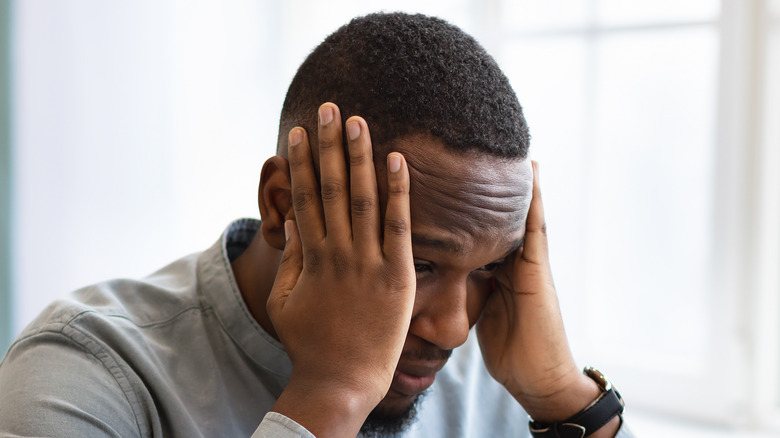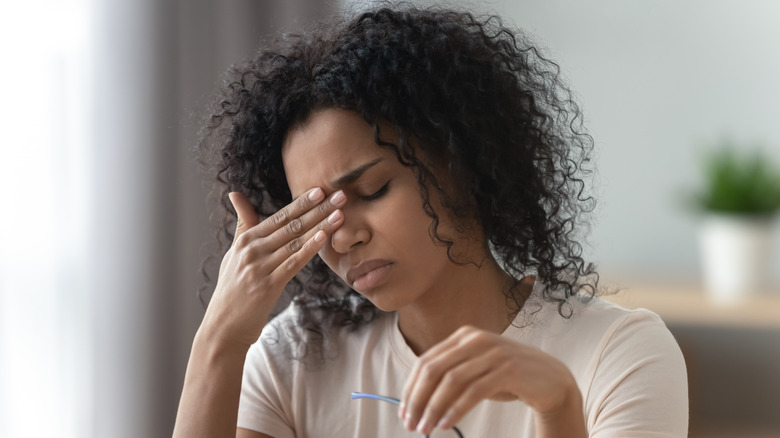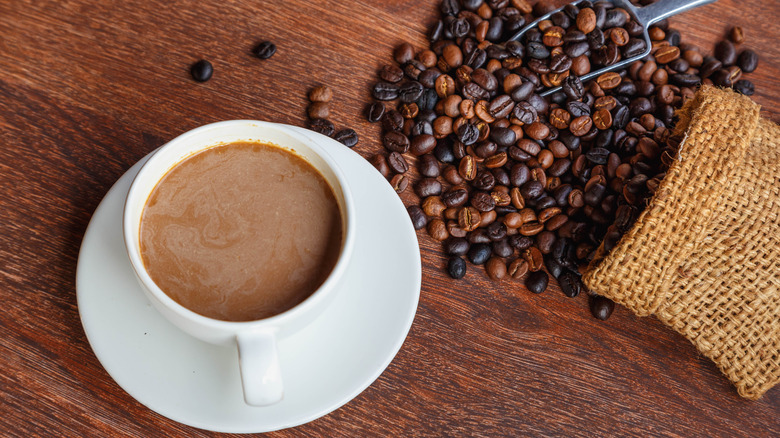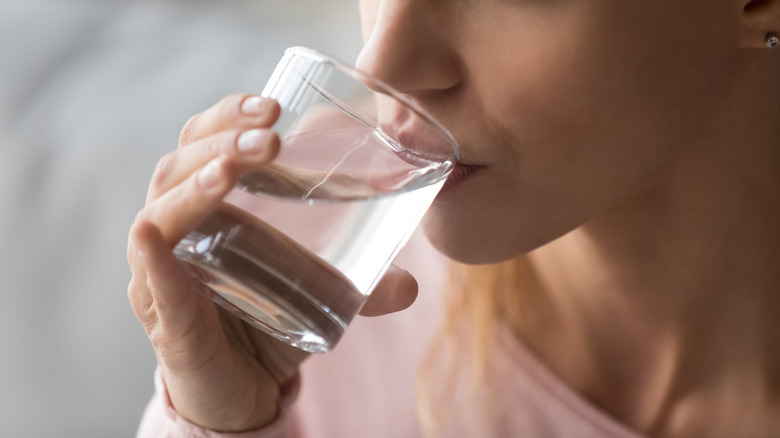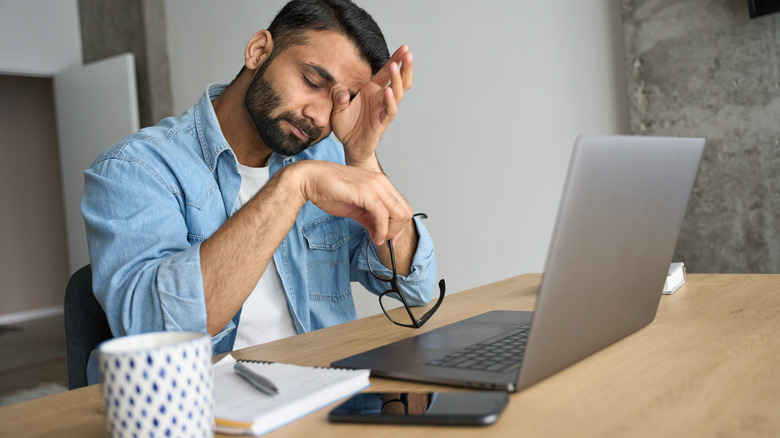What It Really Means When You Get A Headache In The Afternoon
Headaches are a pain, literally. Do you get a headache every day in the afternoon? Maybe it's some days or most days, but it's always in the afternoon. That can be disruptive to your life, affecting your work, health, and family. Any type of headache can occur in the afternoon. However, getting a headache only in the afternoon every day or almost every day could be caused by something you're doing in the morning. In addition, there can be triggers that are contributing to your afternoon headaches, which can cause pain in part or all of your head (via Healthline).
According to Bustle, you can treat your headache in a few ways to relieve pain instantly. You can try ice or heat therapy: Hold an ice pack or heating pad to your neck or head for about 15 minutes. Some find that heat works better to relieve headache pain, while others get better results with ice. You can also take a dose of ibuprofen, aspirin, or acetaminophen. Alternatively, meditate and practice deep breathing — a guided meditation with deep breathing exercises can be specifically helpful for a headache, because it can help you relax.
However, in order to eliminate your afternoon headaches for good, you have to determine your triggers.
You may be too stressed
If your afternoon headaches make you feel like you have a tight band around your head, you might be getting tension headaches, also called tension-type headaches, per the Mayo Clinic. Tension headaches are the most common type of headache. Other symptoms are tenderness in the shoulder and neck muscles, as well as on the scalp. The tight band feeling is usually in your forehead, sides of your head, and back of your head. You may also feel a dull, steady ache in your head. According to Johns Hopkins Medicine, tension headaches don't usually cause sensitivity to light, nausea, or vomiting. In addition, tension-type headaches aren't usually severe and come on slowly.
Stress and muscle tension can cause tension headaches, so it's vital to combat stress to reduce them. Stick to a healthy daily routine that includes regular exercise, good sleep hygiene, and nutritious meals. Avoid skipping breakfast. Manage stress by using relaxation exercises such as yoga, journaling, deep breathing, meditation, and getting massages. Lastly, see your doctor if your headaches persist or worsen.
Caffeine may be triggering your headaches
Caffeine is often an ingredient in medications for headaches, but it's not to directly treat the headache, according to the American Migraine Foundation. Instead, the caffeine is there to help your body absorb the other ingredients. Indeed, caffeine is a tricky thing — it can help treat a headache if you're experiencing caffeine withdrawals (for example, if you've gone 24 hours without your usual cup of joe), but can also trigger migraine headaches.
While caffeine itself is an oft-cited trigger of afternoon headaches, it can cause another common trigger in the form of dehydration. Add an eight-ounce glass of water for every caffeinated drink you have, whether it's coffee, tea, soda, or an energy drink. Bustle agrees, adding that cutting back on caffeine can help you stay hydrated. Your morning cup of caffeine will start to wear off in the afternoon, so that could be the culprit behind your afternoon headaches.
The American Migraine Foundation recommends tracking your caffeine intake and headaches. Do you always have a soda or energy drink at lunch? Are you getting headaches when you skip your coffee in the morning? Keep a journal to see if caffeine is your afternoon headache trigger. You may need to cut out caffeine.
You might be hungry or dehydrated
As mentioned before, dehydration could be causing your afternoon headaches. Caffeine can play a role in dehydration, so make sure you're drinking an extra cup of water for every caffeinated drink you have to stay hydrated. Bustle recommends checking your urine — it should be clear or light yellow, indicating you're hydrated. If it's darker, you need to drink more water. According to Insider, dehydration makes the blood vessels in your brain shrink, causing that ache in your head. If you feel throbbing pain on both sides of your head, you're likely experiencing a dehydration headache. Dehydration symptoms include tiredness, feeling thirsty, dizziness, and dry mouth.
Bustle also says eating too much sugar, overconsumption of processed foods, or skipping a meal can lead to headaches. If you often skip breakfast or lunch, that could explain why you get afternoon headaches. Eat regular, healthy meals and drink plenty of water to stay hydrated.
Your eyes may be strained
Eyestrain is a common problem for anyone spending extended time staring at a screen, driving, or reading. UAB Medicine points out that eyestrain can lead to headaches, and chronic eyestrain can lead to chronic headaches. For example, if you're staring at a computer screen all morning, you'll likely get headaches in the afternoon if you do nothing to reduce eyestrain.
According to the American Academy of Ophthalmology (AAO), eyestrain can mean your eyes feel tired, dry, or watery. You may also have blurry vision. There are a few ways to prevent eyestrain, and the best one is by using the 20-20-20 rule. Set a timer for every 20 minutes while you're working on a computer. Look at something at least 20 feet away for 20 seconds or longer when the timer goes off. Using eye drops and a humidifier can also help. If you're driving, wear sunglasses and adjust your air vents so they're not blowing directly on your face, which can dry your eyes.

